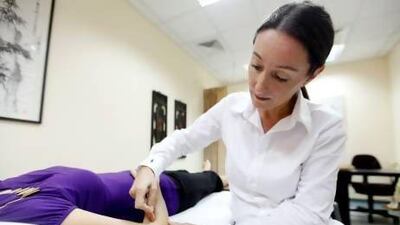Thousands of Emiratis are turning to alternative medicine because they are not satisfied with traditional care.
Alternative medicine centres said they have seen a significant rise in the number of UAE nationals.
Nearly 20 per cent of the more than 15,000 patients at the Homoeopathic Medical Specialised Clinic in Abu Dhabi are Emirati, compared with just 5 per cent when it opened 10 years ago.
"When we first came here most of our patients were Asians: Indians, Bangladeshis. In the beginning it was very difficult," said Dr Naseem Khan Afridi, a homoeo physician at the clinic. Nationals "were a little scared to take our medicine and thought it may be dangerous. Now they love it. They see the results and spread news to family and friends".
Dr Afridi is licensed to practice homeopathy. Not all homeopathists are physicians, but some hold dual licences. The majority study at alternative medicine schools. All alternative practices are regulated by the Dubai Health Authority, Health Authority - Abu Dhabi or the Ministry of Health.
Homeopathy holds that natural substances capable of causing diseases in a healthy person can be used in a diluted form as a remedy to treat a similar condition in a someone who is sick.
Conventional medicine, which works through the bloodstream, homeopathy works through the nerves.
Emiratis say they chose alternative medicine because they were not satisfied with the results of conventional medicine or they believed it was safer.
Acupuncture is a popular alternative therapy in the UAE.
Dr Hu Qiwen at the Gulf Chinese Medical Centre in Abu Dhabi sees about 30 patients a day, nearly a fifth of whom are Emirati. Just three years ago, only 10 per cent of his 20 daily patients were nationals.
Most patients come to him for chronic pain and internal problems. "This is all because of the oversensitivity of autonomic nerves, which control the function of the internal organs," Dr Hu said. "Through acupuncture we can desensitise these autonomic nerves."
Between March 2010 and March 2012, about 40 per cent of the 10,112 patients at The Dubai Herbal and Treatment Centre, which offers a number of alternative therapies, were Emirati - almost evenly distributed between men and women. Most seek help after getting frustrated by the side effects and unsatisfactory results of standard treatments, said Dr Maria Ridao Alonso, the centre's managing and medical director.
There is ongoing debate about the effectiveness of alternative medicine, with numerous conflicting studies. The medical community, however, insists the existing research is not sufficient and studies are not standardised.
__________________
The Numbers
40% of patients at the Dubai and Herbal Treatment Centre are Emirati
20% of patients at the Homoeopathic Medical Specialized Clinic are Emirati
20% of patients at the Gulf Chinese Medical Center are Emirati
60,000 people in Dubai sought alternative medicine in 2011
24% of alternative medicine visits in Dubai were for homeopathy
__________________
"In modern medicine, we use an evidence-based approach; this is still lacking in alternative medicine," said Dr Priyadarshan Gopalakrishnan, a specialist physician at the Aster Medical Centre in Discovery Gardens.
"There needs to be proper studies that look at all the possible adverse effects of alternative medicine and show that a certain percentage of individuals presented a positive outcome. These studies also need to follow standards and show consistent results."
Part of the problem, Dr Gopalakrishnan said, is the large range of services that fall under the bracket of alternative medicine, from homeopathy and acupuncture to treatments focusing on bioenergy balance and spirituality, such as ayurveda.
This does not mean there is no potential for alternative medicine.
Dr Saad Ghazal Al Aswad, senior consultant at the department of obstetrics and gynaecology at Tawam Hospital, often refers cancer patients for acupuncture to alleviate their pain. Many patients respond with positive results, he said.
"It certainly does have a place, at least with acupuncture, which has been well documented to relieve localised pain," he said. "However there are no studies comparing alternative medicine to standard medicine and that is my main concern. Most evidence that practitioners cite is anecdotal."
Practitioners of alternative care contend that the lack of support, funding and research is the result of a business-oriented medical environment. "There's no lobby behind alternative medicine like there is for allopathic medicine," said Dr Afridi. "If there were, things would be different."

